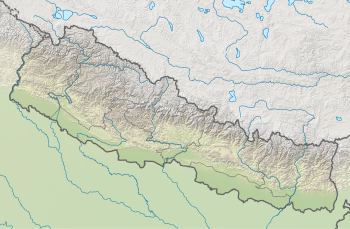Cho La, Nepal
Cho La is a summit pass located 5,420 metres (17,782 ft) above sea level in the Solukhumbu District in northeastern Nepal. It connects the village of Dzongla (4,830 metres (15,850 ft)) to the east and the village of Thagnak (4,700 metres (15,400 ft)) to the west.
| Cho La | |
|---|---|
 Cho La, panoramic view to the east | |
| Elevation | 5,420 m (17,782 ft) |
| Location | Solukhumbu District, Nepal |
| Range | Himalayas |
| Coordinates | 27.962122°N 86.751923°E |
 Location of the pass  Cho La (Nepal) | |
Tourism
The pass is on the Gokyo trail in the Khumbu Everest region. To the west the trail continues to the Gokyo Lakes, crossing the Ngozumpa glacier on the way. To the east the trail joins the Everest Base Camp trek.[1]
The pass can be physically demanding and may require crampons on top of the slippery glacier. The edge of the glacier is unstable.[1]
Stay Safe
Cho La Pass can be crossed without a guide and without crampons, but you are advised to do your research before. Get up early (around 5 am) to make the crossing before mid-day and re-assess the hike when the weather turns bad. Snow can obscure the path across the glacier and erase foot tracks if you're trekking without a guide. Rock fall is another danger to consider, even in good weather.
The trek is usually made from the town of Dzongla towards Thagnak as it is an easier climb. Most maps will tell you the glacier is on your right side. If you are crossing from Thagnak towards Dzongla, the glacier will be on your immediate left and can be obscured by snow. This route is very difficult even for fit trekkers as it is very steep and the terrain is made of loose rock, large boulders and ice.
Stories are often shared in tea houses of deaths occurring on Cho La Pass, but very little official information on this is found online. In April 2017, a reported two people died while crossing Cho La Pass and one person (Aussie) was still missing.
- Cho La, Nepal








References
- Armington, Stan (2001). Trekking in the Nepal Himalaya. Lonely Planet. pp. 480. ISBN 978-1864502312.